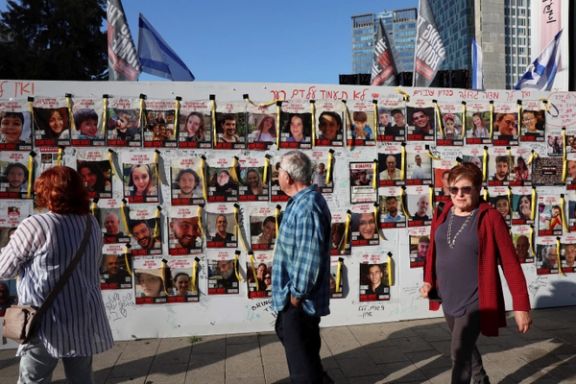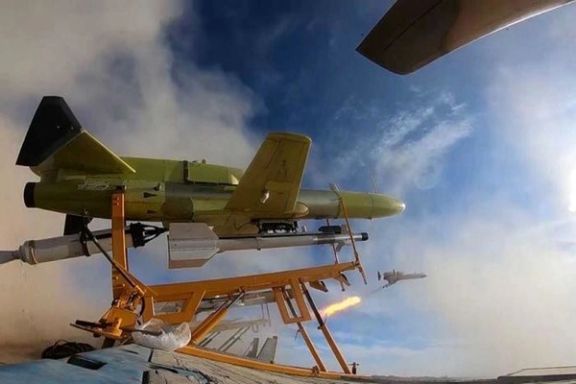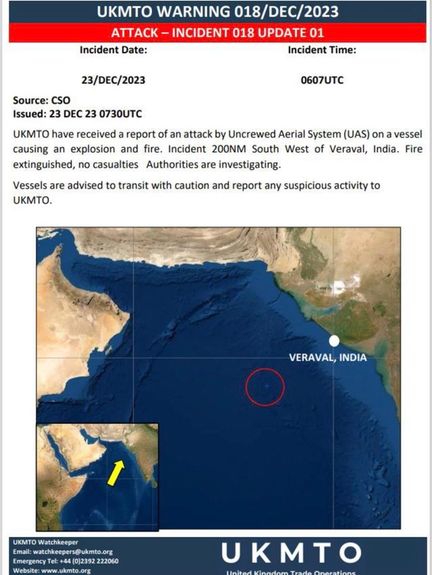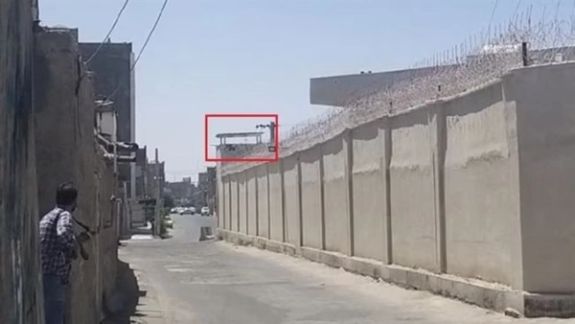Iranian Activist Alinejad Calls For Solidarity With Israeli Women

Prominent Iranian dissident Masih Alinejad has criticized the inadequate response from organizations and women's rights activists to Hamas' violence against Israeli women.

Prominent Iranian dissident Masih Alinejad has criticized the inadequate response from organizations and women's rights activists to Hamas' violence against Israeli women.
Alinejad drew attention to the parallel with sexual assault by agents of the Islamic Republic against detained Iranian protesters.
"If we do not unite now, terrorists will certainly commit more sexual assaults against women," warned Alinejad. Expressing confusion over the lack of global solidarity in condemning the Hamas attacks, she pointed out the importance of a united front against such atrocities.
Hamas gunmen sexually assaulted dozens of women during their October 7 attack on Israel and took scores hostage. Reports say that many of the female hostages have been raped in Gaza.
Alinejad highlighted a distressing similarity in the treatment of protesters by the Islamic Republic, citing incidents following the murder of Mahsa Amini at the hands of morality police. She emphasized that rape should never be used as a weapon of war and stressed the urgency of international unity to prevent further victimization.
Protesters who experienced sexual harassment and assault during the 2022 anti-government movement in Iran have shared their harrowing stories with Iran International. Both female and male victims, some as young as eighteen, revealed the widespread nature of sexual violence against detained protesters.
The US Department of State condemned reports of sexual assault against protesters, denouncing the Iranian regime's systematic use of sexual violence to “instill fear and silence victims as reprehensible.” The department praised the courage of Iranians standing against such actions and called for global support against such acts.

The Tehran municipality has grown increasingly critical of dogs, signaling that the authorities' snarls are a prelude to an impending crackdown on man's best friend.
In a renewed campaign against dog ownership, Tehran Mayor Alireza Zakani said this week, “Dog-walking in the city is very wrong and illegal, especially when done without rules and regulations. Legal authorities must intervene and change the culture in such a way that if someone wants to walk a dog, they do it by the rules.” Zakani's deputy, Hossein Nazari, described dog walking as one of "challenges" for the capital.
The religious regime views keeping dogs as a symbol of Westernization that can be dangerous and should be prohibited. Dogs are generally considered 'najis' or 'impure' in Islam and banned in public places by some majority-Muslim countries including Saudi Arabia. Iranian parliamentarians proposed a bill last year banning selling and keeping of pets, claiming that the ban was meant to protect public health. While working dogs have always been common in Iran’s rural areas and on farms, keeping pets has only recently become fashionable in urban areas despite occasional police crackdowns.
Several of the growing number of dog owners in the capital shared their grievances with Iran International, detailing their persistent conflict with authorities and religious individuals subscribing to the Islamic Republic’s rancorous views on dogs.
The owner of Snow, a black terrier mix, said she consistently faces objections from neighbors when walking her dog in the green areas of their apartment complex in northern Tehran. Non-dog-owning residents argue that dogs should be prohibited in common areas, citing concerns about their children playing there. She added that the situation escalates on the streets, highlighting instances where her friends received fines for having their dogs in cars outside designated boxes.

The issue extends beyond communal building areas, as experienced by Toffee's owner, who has an apricot toy poodle. Residing in a central Tehran neighborhood with a conservative social context, she faced persistent harassment from neighbors, ultimately prompting her to move. Her religious neighbors were intolerant of having a dog in the building, continually threatening to file a lawsuit for her eviction, she said.
In the absence of specific regulations regarding dogs, authorities employ alternative measures to exert pressure on dog owners, primarily through laws governing shared spaces within buildings. These regulations imply that owning and keeping animals, including dogs, in communal areas is prohibited. The Islamic Penal Code, particularly Article 688, reinforces this prohibition by penalizing actions deemed threatening to public health, citing potential health risks associated with the possession of dogs. Violations may result in legal consequences, as neighbors have the ability to file complaints against such practices.

The owner of Woody, a golden cocker spaniel, said she faces crippling stress whenever she tries to take Woody for walks, adding that the recent warnings from the authorities have made the situation even more stressful. “Dogs have no rights in Iran,” she lamented, referring to a lack of clear regulations on where dogs are permitted.
The absence of clear regulations also leads to other legal challenges, as seen in the case of Leo's owner, who lost her dog due to veterinarian malpractice. Recounting her experience, she said, "I attempted to seek legal action for my lost dog, but I was advised not to waste my time and energy as it would be futile." She pointed out, "Even human beings struggle to find justice in Iran, let alone the poor dogs."

Earlier in the year, a real estate agency was sealed off and its owner arrested after a video went viral of the property agency transferring the ownership of an apartment to a dog. The footage showed an Iranian couple signing a contract transferring the title of their apartment to their small furry white dog Chester. Iran’s police and Tehran’s deputy prosecutor Reza Tabar mentioned “issuing an invalid contract for an apartment unit” as the reason behind the arrest. Without elaborating on the legal grounds, Tabar said “this action is illegal and was meant to demean the norms of society.”
While officials such as the mayor of Tehran argue for the need to regulate dog ownership, implementing effective laws presents a significant quandary. Crafting regulations would inadvertently entail granting certain freedoms to dogs and their owners, such as allocating designated areas or parks for walks – a prospect that contradicts the state's ideological stance.
The proposed legislation, which was never followed up and labeled as a waste of parliament’s time, envisaged a monetary fine ranging from $900 to $2,700, along with the possibility of impounding the animal. Additionally, real estate agents would be required to prohibit dogs in rental agreements within three months of the law's enactment, with corresponding fines for non-compliance. Individuals walking their pets in the street could potentially face a three-month jail term, or if driving with their dog, the confiscation of their car for three months.
Previous attempts to address the issue involved police campaigns rounding up dogs and their owners, serving as more of an intimidation tactic than a systematic solution. One major impediment to enforcement is the lack of proper facilities to accommodate detained dogs. With no dedicated spaces to house them and a shortage of personnel to care for the animals, the authorities face a logistical dilemma in cracking down on dog owners.
The recurrent conflict surrounding dog ownership tends to resurface intermittently but often becomes overshadowed by popular protests on broader human rights issues or economic challenges. The government's persistent struggle to regulate dog ownership represents another intrusion into citizens' private lives, adding to a myriad of existing bans, including restrictions on alcohol consumption, dating, public appearances without "proper hijab" for women, mixed-gender parties, and singing by women.

A vessel affiliated with Israel was hit by a drone in the Indian Ocean, 200 nautical miles Southwest of India, in a sign of attacks spreading against maritime traffic.
United Kingdom Maritime Trade Operation reported the incident on Saturday, as attacks by Iran-backed Houthi forces have escalated against commercial shipping in the Red Sea. The location is hundreds of miles from the Iranian and Yemeni territories, and it is not known from where the drone was launched.
Later, the vessel was identified as the Liberian-flagged tanker as MV Chem Pluto carrying crude oil from Saudi Arabia.

Some Iranian one-way kamikaze drones, such as Shahed 136 used by Russia against Ukraine, have a range of at least 1,000 kilometers.
Meanwhile, an Iranian Revolutionary Guards commander said the Mediterranean Sea could be closed if the United States and its allies continued to commit "crimes" in Gaza, Iranian media reported on Saturday, without explaining how that would happen. However, use of suicide drones launched from Syria, where Iran has a strong military presence, could endanger shipping in the Mediterranean Sea.
"They shall soon await the closure of the Mediterranean Sea, (the Strait of) Gibraltar and other waterways," Tasnim quoted Brigadier General Mohammad Reza Naqdi, coordinating commander of the Guards, as saying.
Iranian-backed Houthis began launching suicide drones and missiles at commercial vessels in the Red Sea in mid-November following Iranian Supreme Leader Ali Khamenei’s call to block Israeli commerce.
The US last week announced a naval coalition involving 20 countries aimed at helping safeguard vessels from attacks in the Red Sea. However, it is not clear if the naval coalition is a defensive arrangement or will conduct retaliatory attacks to deter the Houthis.

A Swedish- Iranian academic faces danger of execution in Iran after a court in Sweden affirmed a life sentence for a former Iranian jailer, Amnesty International says.
Ahmadreza Djalali was detained in 2016 while on a visit to Iran and accused of espionage in a non-transparent trial. Later he was sentenced to death.
Amnesty International issued a statement on Friday saying that Djalali “is at grave risk of imminent retaliatory execution.” Earlier this week, an appeals court in Sweden reaffirmed the life sentence of Hamid Nouri, a former prison official in Iran, who was convicted for his role in the killing of up to 5,000 prisoners in 1988.
“Amid a sharp spike in executions in Iran since November, mounting evidence indicates that Iranian authorities are threatening to carry out Ahmadreza Djalali’s execution in retaliation for their unmet demands to pervert the course of justice in Sweden,” Amnesty stated.
Djalali is widely considered as another hostage held by Iranian authorities to put pressure on Sweden and other Western countries.
Amnesty referred to the hostage taking in its statement, saying, “The international community, including Sweden, must immediately call on the Iranian authorities to halt any plans to execute Ahmadreza Djalali, end their shocking assault on the right to life, release him immediately, and put a moratorium on all executions. Iranian officials must be investigated for the crime of hostage-taking”.
This year, the United States allowed $6 of Iran’s funds to be unblocked in South Korea in exchange for the release of five American dual nationals held in Iran for years.

Iranian Baluch activists have reported a significant shooting incident near the Quds base of the Islamic Revolutionary Guard Corps (IRGC) in Sistan-Baluchistan province.
However, Governor Saeed Tajlili claimed that the shooting around the base was linked to a wedding celebration. According to initial reports, gunfire was reported last night in the vicinity of the base in Saravan. Tajlili added that military forces have detained the groom in connection with the incident.
As of now, no additional information is available concerning the circumstances surrounding the reported shooting.
The development comes on the heels of a recent attack on December 15 by the Sunni Jaish al-Adl militant group, targeting a police station in Rask, a small city in Sistan-Baluchistan Province. Iranian state media and Baluch groups reported a death toll of at least 12 police officers and several attackers killed during prolonged gunfire at the main police headquarters. Seven police officers sustained injuries, some critical.
Sistan-Baluchistan, an economically challenged province with a significant Sunni population of the Baluch ethnic group, grapples with ongoing tensions with Iran's Shiite clerical rulers. Regular clashes between security forces, Sunni militants, and drug smugglers characterize the region.
Discrepancies persist in casualty figures, with official reports stating 12 officers killed and at least seven injured, while Jaish al-Adl insists on a higher toll of 50.

Iran was "deeply involved" in planning drone and missile attacks against commercial vessels in the Red Sea by providing intelligence, the White House said on Friday.
This is the clearest statement yet implicating Iran by the Biden administration in the Red Sea attacks that has threaded softly with Iran, according to critics. Iran has so far not responded to the US statement.
Yemen’s Houthis, who receive military assistance and all types of weapons from Iran began launching attacks on commercial shipping in the Red Sea from mid-November following Iranian Supreme Leader Ali Khamenei’s call to block Israeli commerce.
Houthis, who say their attacks are in support of Hamas under siege by Israel in Gaza, have forced shippers to change course and take longer routes around the southern tip of Africa.
"We know that Iran was deeply involved in planning the operations against commercial vessels in the Red Sea. This is consistent with Iran's long-term materiel support and encouragement of the Houthis' destabilizing actions in the region," White House national security spokeswoman Adrienne Watson said in a statement.
"This is an international challenge that demands collective action," Watson said.
Iran denies involvement in attacks by the Houthis in the Red Sea, but state media praise the Houthi actions, as well as Hamas and attacks by other Iranian proxies against US bases in the region. Apart from the Red Sea, militant groups in Iraq and Syria have launched more than 100 drone and rocket attacks on US interests.
Iranians because they're really calling the shots here."
The US last week announced a naval coalition involving 20 countries aimed at helping safeguard vessels from attacks in the Red Sea. Some of the countries involved have said operations to protect commercial traffic will be as part of existing naval agreements.
However, it is not clear if the naval coalition is a defensive arrangement or will conduct retaliatory attacks to deter the Houthis.
"I am absolutely stunned that we're still sitting there in a defensive mode," said former Vice Chief of Staff of the US Army Gen. Jack Keane in an interview with Fox News on December 15. "To shut these people down, you have to take away their capability to do it... You go after the rockets… You go after their entire command and control system… you go after their entire command and control system… you go after the Iranians because they're really calling the shots here."
On December 16, White House National Security Advisor Jake Sullivan stated, "While the Houthis are pulling the trigger, they're being handed the gun by Iran. And Iran has a responsibility to take steps themselves to cease these attacks." However, no attempt has been made to degrade the Houthis ability to disrupt shipping that is impacting oil prices and disrupting international commerce.
“We have capabilities to sink your fleet, your submarines, your warships,” a top Houthi official said, according to the IRGC-affiliated Tasnim news agency. “The Red Sea will be your graveyard.”